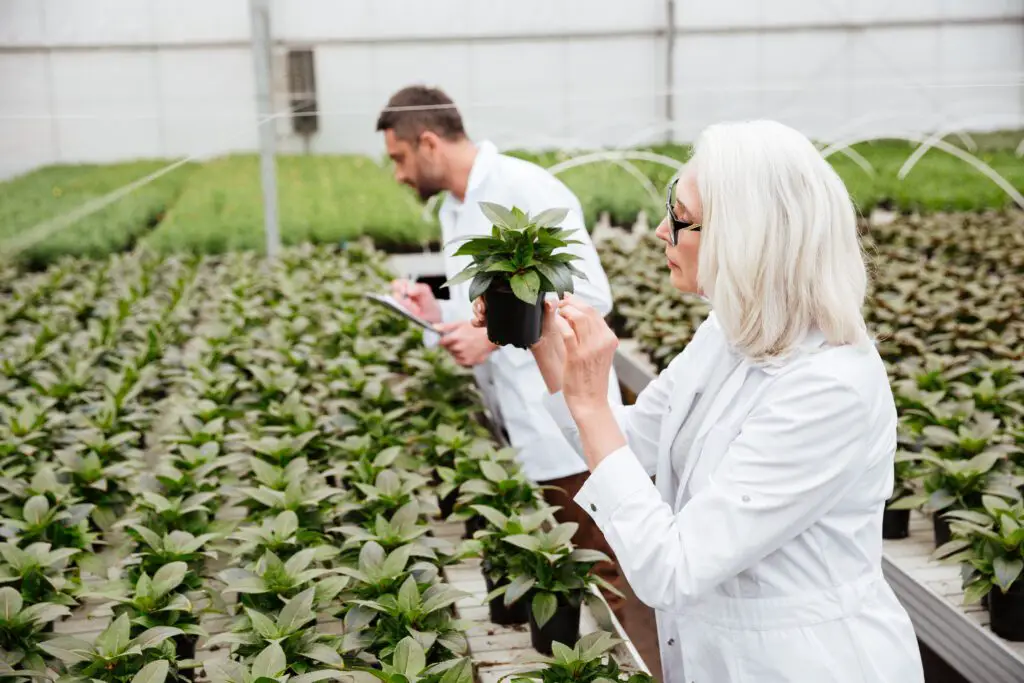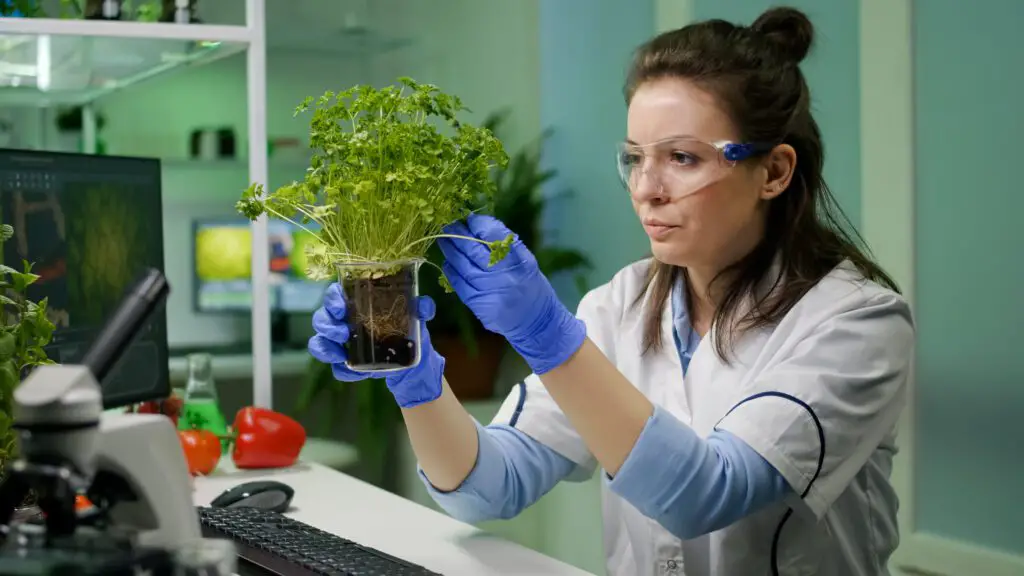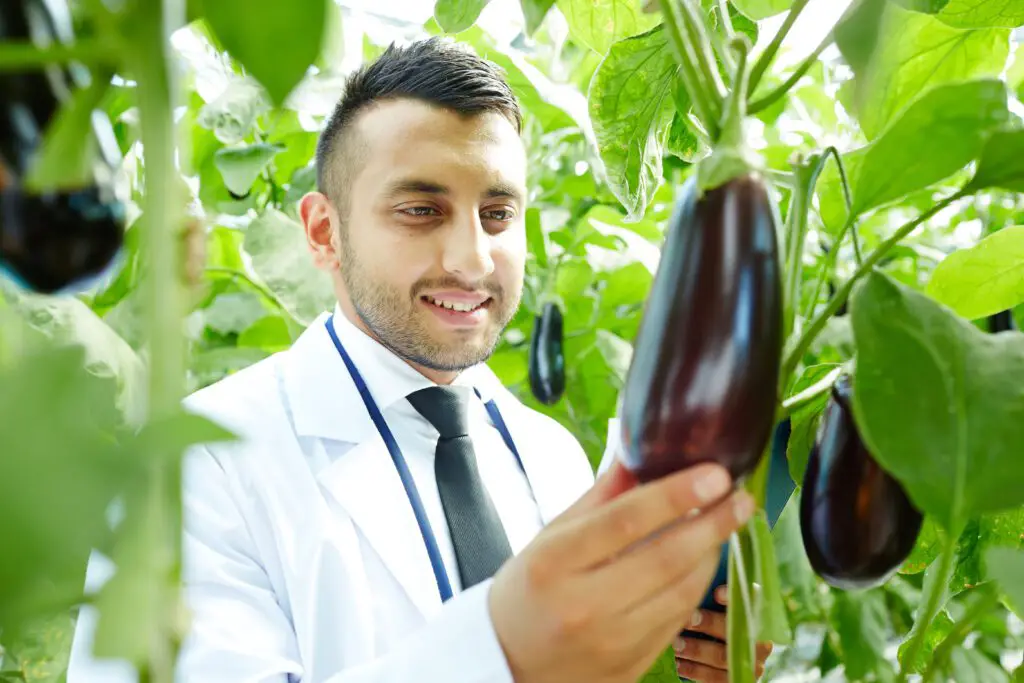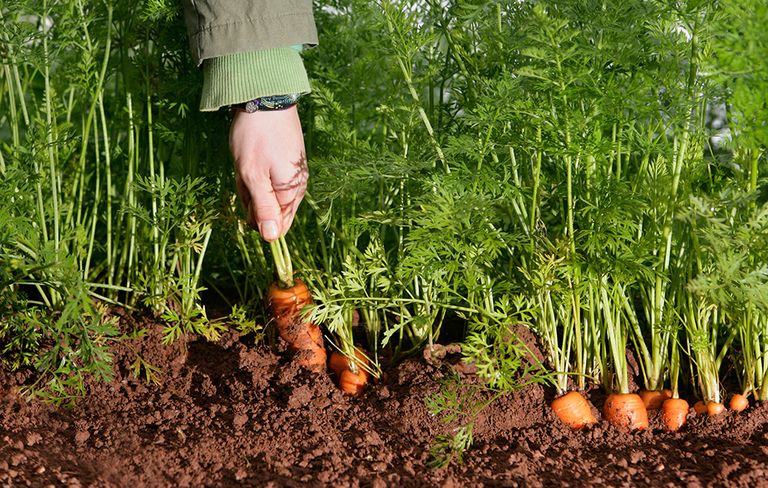What is OMRI Listing? How to Choose and Use Organic Products for Your Plants
Table of Contents
Understanding the Importance of Organic Products for Plant Growth
Organic products have become increasingly popular among gardening enthusiasts due to their numerous benefits for plant growth. Unlike conventional products that are laden with synthetic chemicals, organic products are derived from natural sources and are free from harmful additives. By choosing organic products for your plants, you are not only providing them with the necessary nutrients but also ensuring their long-term health and vitality.

One key advantage of using organic products is their ability to improve soil quality. Organic fertilizers, for instance, nourish the soil with essential nutrients and microorganisms that promote the growth of beneficial bacteria and fungi. This, in turn, enhances the soil structure, increases water retention, and improves nutrient availability for plants. Additionally, organic products contribute to the overall sustainability of your garden by reducing chemical runoff and preserving the biodiversity of the surrounding ecosystem.
Furthermore, organic products support the overall well-being of plants by boosting their natural defense mechanisms. Studies have shown that plants grown with organic fertilizers have higher resistance against pests and diseases, thanks to the presence of natural compounds that stimulate their immune responses. This reduces the need for harmful pesticides and insecticides, creating a healthier and safer environment for both plants and humans. As a gardener, it is crucial to understand the importance of using organic products to nurture and protect your plants, ultimately leading to a thriving and sustainable garden.
Identifying the Key Elements of an OMRI Listing
An OMRI (Organic Materials Review Institute) listing is a valuable tool for gardeners and plant enthusiasts who are looking to incorporate organic products into their gardening practices. The OMRI listing serves as a certification that ensures the organic products meet specific criteria and standards set by the institute.

One of the key elements to look for in an OMRI listing is the product’s ingredients. The listing should clearly state the organic ingredients used in the product and any additives or synthetic substances that are prohibited. This transparency allows gardeners to make informed choices about the products they use and ensures that they are truly organic.
Another important element to consider is the product’s manufacturing process. The OMRI listing should provide details about how the product is made, including any special procedures or requirements that must be followed. This information can help gardeners understand the quality and integrity of the product, ensuring that it is produced in a way that aligns with organic principles. A thorough understanding of these key elements will empower garden enthusiasts to make well-informed decisions when selecting organic products for their plants.
Exploring the Certification Process for Organic Plant Products
The certification process for organic plant products is a critical component in ensuring their authenticity and credibility. For a product to be recognized as organic, it must undergo a stringent evaluation that adheres to specific standards and criteria. This process is typically carried out by independent certifying bodies that are accredited and recognized by industry organizations.

During the certification process, various aspects of a product’s production, handling, and ingredients are thoroughly examined. This includes the evaluation of farming practices, such as the use of organic fertilizers, pest and weed management methods, and the absence of genetically modified organisms (GMOs). Additionally, the certification process scrutinizes the source and quality of the ingredients used, ensuring that they meet the organic standards set forth by regulatory bodies.
To obtain certification, organic plant product manufacturers are required to maintain detailed records of their production processes, including sourcing, harvesting, storage, and distribution. These records play a crucial role in the certification process, as they provide transparency and traceability, enabling certifying bodies to verify the product’s compliance with organic standards. By going through this rigorous evaluation process, organic plant products gain credibility and trust among consumers who value the assurance that they are purchasing authentic organic products.
Evaluating the Benefits of Using Organic Products for Your Plants
Organic products have gained significant popularity in recent years due to their numerous benefits for plant growth. Gardeners and plant care enthusiasts have recognized the advantages of using organic products, which include improved soil health, enhanced plant nutrition, and reduced environmental impact.
One of the key benefits of organic products is their ability to improve soil health. Organic fertilizers, such as compost and manure, contain essential nutrients that are slowly released into the soil, providing a steady supply of nourishment to plants. This promotes the growth of beneficial microorganisms in the soil, leading to increased soil fertility and improved water retention. As a result, plants grown with organic products often exhibit stronger root systems, better resistance to diseases and pests, and overall healthier growth.

In addition to enhancing soil health, organic products also provide plants with a balanced and natural source of nutrition. Unlike synthetic fertilizers, which often deliver a high concentration of specific nutrients, organic fertilizers contain a broader spectrum of nutrients that are necessary for plant growth. This ensures that plants receive a well-rounded diet, which in turn leads to improved plant vitality and resilience. Furthermore, organic products promote the development of beneficial microorganisms in the rhizosphere, fostering a symbiotic relationship between plants and soil. This symbiosis can enhance nutrient uptake and improve overall plant health.
By utilizing organic products, gardeners can minimize their environmental impact. Organic farming methods prioritize the use of renewable resources, such as compost and cover crops, over synthetic chemicals. This reduces the risk of chemical runoff into water sources and limits air pollution. Organic products also support biodiversity, as they do not harm beneficial insects, birds, or other wildlife. Ultimately, choosing organic products not only benefits individual plants but also contributes to the conservation of our ecosystems.
• Improved soil health: Organic products, such as compost and manure, release essential nutrients slowly into the soil, promoting the growth of beneficial microorganisms and improving water retention.
• Enhanced plant nutrition: Organic fertilizers provide a balanced spectrum of nutrients necessary for plant growth, leading to improved vitality and resilience.
• Symbiotic relationship between plants and soil: Organic products foster the development of beneficial microorganisms in the rhizosphere, enhancing nutrient uptake and overall plant health.
• Reduced environmental impact: By prioritizing renewable resources over synthetic chemicals, organic farming methods minimize chemical runoff into water sources and limit air pollution.
• Support biodiversity: Organic products do not harm beneficial insects, birds, or other wildlife, contributing to the conservation of ecosystems.
Recognizing the Potential Risks of Non-Organic Products
When it comes to gardening and plant care, it is important to be aware of the potential risks associated with non-organic products. Chemical pesticides, fertilizers, and herbicides may provide quick results, but they can also have detrimental effects on both your plants and the environment.
One of the major risks of non-organic products is their impact on soil health. Chemical-based fertilizers can deplete the natural nutrients and beneficial microorganisms in the soil, leading to imbalances and decreased fertility over time. This can result in weaker plants that are more susceptible to diseases and pests.

Additionally, the use of chemical pesticides and herbicides can have harmful effects on beneficial insects, birds, and other wildlife. These products may not only kill off pests and weeds but can also harm pollinators and disrupt the natural ecosystem of your garden. This can have long-term consequences for biodiversity and overall ecosystem health.
It is also important to note that non-organic products can leave residues on plants and produce. These residues may not only be harmful to human health but also have implications for food safety. By using organic products, you can minimize the risk of ingesting potentially harmful chemicals and ensure that your plants are producing healthy, pesticide-free fruits and vegetables.
Understanding the potential risks associated with non-organic products allows us to make informed decisions and choose safer alternatives for our plants. By opting for organic options, we can promote sustainable and eco-friendly gardening practices that benefit both our plants and the environment.
Researching Organic Product Options for Different Types of Plants
Different types of plants have unique needs when it comes to organic product options. Whether you’re growing fruits, vegetables, flowers, or herbs, it’s important to consider the specific requirements of each plant to ensure optimal growth and health.
For example, when researching organic product options for fruit-bearing plants, it’s crucial to prioritize products that provide balanced nutrition and support robust fruit development. These products should contain essential nutrients such as nitrogen, phosphorus, and potassium, along with micronutrients like calcium, magnesium, and iron. Additionally, organic products that promote healthy root growth, such as mycorrhizal fungi, can enhance nutrient uptake in fruit-bearing plants and improve overall productivity.

When it comes to flowering plants, organic options that promote vibrant blooms and strong root systems should be your focus. Look for products that contain high levels of phosphorus, which plays a vital role in flower development. Additionally, organic fertilizers that include beneficial microbes can stimulate root growth and enhance the plant’s ability to absorb nutrients effectively.
For herb gardens, choosing organic products that prioritize leafy growth and flavor is key. Organic fertilizers rich in nitrogen can promote lush, green foliage, while products that contain potassium can enhance a herb’s essential oil production, leading to more flavorful and aromatic leaves. Additionally, organic weed control options can help maintain a healthy and weed-free herb garden.
Understanding the specific needs of different types of plants is essential when researching organic product options. By selecting the right products tailored to the requirements of your plants, you can provide them with the necessary nutrients and support they need to thrive naturally.
Considering the Environmental Impact of Organic vs. Non-Organic Products
Organic gardening has gained popularity in recent years due to its positive impact on the environment. Compared to non-organic products, organic alternatives have several advantages in terms of their environmental impact. One key aspect is the reduction in chemical pollution. Non-organic products often contain synthetic fertilizers and pesticides that can contaminate water sources, harm wildlife, and disrupt delicate ecosystems. In contrast, organic products rely on natural, plant-based ingredients that pose less risk to the environment. Additionally, organic farming practices strive to promote soil health, biodiversity, and sustainability, which further contribute to a positive environmental impact.

Another important aspect to consider is the carbon footprint associated with organic and non-organic products. The production and transportation of synthetic fertilizers and pesticides contribute to greenhouse gas emissions, exacerbating climate change. On the other hand, organic products typically have a lower carbon footprint as they make use of natural processes and avoid the energy-intensive production and transportation of synthetic inputs. By choosing organic products, gardeners can make a positive contribution towards reducing greenhouse gas emissions and mitigating climate change.
In conclusion, when considering the environmental impact of organic versus non-organic products, it becomes evident that organic alternatives offer significant benefits. From reducing chemical pollution to lowering carbon emissions, organic gardening practices align with sustainable and environmentally friendly principles. By incorporating organic products into their gardening routine, enthusiasts can play a part in creating a healthier and more sustainable planet.
Assessing the Quality and Purity of Organic Plant Products
When assessing the quality and purity of organic plant products, it is important to consider several factors to ensure that you are obtaining the best possible products for your plants. One key aspect to look for is the organic certification label, such as the OMRI (Organic Materials Review Institute) listing. This certification indicates that the product has met strict standards for organic production and has been evaluated by an independent organization.
In addition to the certification label, it is also essential to examine the product’s ingredients and manufacturing processes. Organic plant products should be made from natural, non-synthetic materials and should not contain any harmful chemicals or toxins. It is advisable to thoroughly read the product labels and check for any potentially harmful additives or substances.

Furthermore, conducting research on the company or brand behind the organic product can provide insights into their commitment to quality and purity. Look for brands that prioritize sustainable and ethical practices in their production processes. You can also check for customer reviews and testimonials, as they can provide valuable feedback on the effectiveness and quality of the product.
By thoroughly assessing the quality and purity of organic plant products, you can ensure that you are providing your plants with the best possible care. This will not only promote healthy plant growth but also contribute to a more sustainable and environmentally friendly approach to gardening.
Familiarizing Yourself with OMRI-Listed Brands and Products
If you are a gardening enthusiast looking to incorporate organic practices into your plant care routine, familiarizing yourself with OMRI-listed brands and products is a crucial step. OMRI, which stands for Organic Materials Review Institute, is an independent organization that evaluates and certifies products for use in organic production. By choosing products with the OMRI listing, you can ensure that they meet the rigorous standards set for organic agriculture.

When it comes to organic gardening, it’s important to understand that not all products labeled as “organic” are created equal. The OMRI listing provides a valuable tool for identifying which brands and products have undergone thorough scrutiny and have been deemed suitable for organic use. By familiarizing yourself with these listings, you can have confidence that the products you choose align with your commitment to organic gardening principles. Additionally, the OMRI listing can serve as a guide for selecting specific products tailored to the needs of different types of plants, helping you achieve optimal results in your garden or hydroponic system.
Reading and Decoding Product Labels for Organic Claims
Decoding product labels for organic claims is an essential skill for any gardening enthusiast. While many products may have labels that claim to be organic, it’s important to understand what these claims truly mean. Reading and decoding product labels can help you make informed decisions about the organic products you choose to use in your gardening endeavors.
When deciphering product labels, the first thing to look for is an official organic certification. Labels that state that the product is certified organic by a recognized organization, such as the USDA or the Organic Materials Review Institute (OMRI), assure that the product meets certain standards. These certifications ensure that the product has been made without the use of synthetic pesticides, fertilizers, or genetically modified organisms (GMOs) and that it has been produced using environmentally friendly practices.
Additionally, it is crucial to examine the list of ingredients on the label. Organic products should contain natural ingredients that are derived from plants, animals, or minerals. Be wary of labels that include synthetic chemicals or additives, as these can diminish the organic integrity of the product. Understanding and evaluating the information on product labels will help you choose the most suitable and authentic organic products for your plants.
Implementing Proper Application Techniques for Organic Products
Proper application techniques play a crucial role in maximizing the effectiveness of organic products for plant growth. When it comes to applying these products, it is important to understand that each type may have specific instructions and guidelines. One key factor to consider is the timing of the application. Organic products often work best when applied during certain stages of plant development. For instance, some fertilizers may be more effective if applied during the vegetative stage, while others are better suited for the flowering or fruiting stages. Understanding the specific needs of your plants and following the recommended application timing can greatly enhance the positive impact of organic products on their growth and overall health.
In addition to timing, proper dosage is also paramount. Over-application of organic products can potentially lead to negative effects, such as nutrient imbalances or even plant damage. On the other hand, under-application may not provide the desired benefits. It is crucial to carefully follow the product instructions and recommendations for dosage. Consider factors such as the specific plant type, size, and growth stage, as well as the product’s concentration and formulation. This information will help you determine the appropriate amount of organic product to apply. Maintaining consistency in dosage, while avoiding excessive use, will foster optimal plant growth while minimizing any potential risks.
Monitoring and Measuring the Effectiveness of Organic Plant Products
When it comes to using organic plant products, it is essential to monitor and measure their effectiveness to ensure optimal growth and health of your plants. Monitoring involves observing the plants closely and conducting regular inspections to assess their overall condition while measuring involves quantifying the impact of the organic products on plant growth and development. By implementing these monitoring and measuring techniques, you can gain valuable insights into the effectiveness of organic products and make informed decisions for your gardening practices.

One of the key aspects of monitoring the effectiveness of organic plant products is to closely observe the plants for any changes in growth, appearance, or overall health. This can be done by assessing factors such as plant height, leaf color, foliage density, and flowering or fruiting patterns. By keeping a record of these observations over time, you can track the progress of your plants and identify any positive or negative effects of the organic products being used. Additionally, monitoring should also include regular checks for signs of pests, diseases, or nutrient deficiencies, as these can greatly impact the effectiveness of organic products. By promptly addressing any issues that arise, you can ensure that the organic products are being utilized to their full potential.
Incorporating Organic Practices into Your Overall Plant Care Routine
It is well-known among gardening enthusiasts that incorporating organic practices into your overall plant care routine can yield numerous benefits. Organic gardening is not just a passing trend; it is a sustainable and environmentally friendly approach that promotes the health and vitality of your plants in the long run. By adopting organic practices, you can create a nurturing environment that supports the natural growth and development of your plants.
One of the key aspects of incorporating organic practices is the use of organic plant products. These products, derived from natural sources such as compost, animal manure, and plant-based materials, provide essential nutrients to your plants without the use of synthetic chemicals. Organic fertilizers, for example, release nutrients gradually and improve the soil structure, enhancing its ability to retain moisture and support healthy root growth. Additionally, organic pest control methods, such as companion planting and biological controls, help to maintain a balance in the ecosystem, reducing the need for harmful chemical pesticides.
By incorporating organic practices into your overall plant care routine, you not only contribute to the well-being of your plants but also to the health of the environment. By avoiding the use of synthetic chemicals, you minimize the release of harmful substances into the soil and waterways. This, in turn, helps to preserve the biodiversity of the surrounding ecosystem and protect the delicate balance of nature. By choosing organic, you can cultivate a garden that is not only aesthetically pleasing but also promotes a sustainable and harmonious relationship with the environment.
What does OMRI stand for and why is it important in organic plant care?
OMRI stands for Organic Materials Review Institute. It is important because it provides a credible certification for organic products, ensuring they meet specific standards and are suitable for use in organic gardening.
Are organic products always better for plants than non-organic products?
Organic products are generally considered better for plants because they are free from synthetic chemicals and promote healthier soil and ecosystems. However, there may be specific cases where non-organic products can be more effective for certain plant care needs.
How can I determine if a product is truly organic?
Look for products that are certified by reputable organizations like OMRI, which confirms their organic status. Additionally, carefully read product labels and look for specific organic certifications or ingredients.
Are there any potential risks associated with using non-organic products on plants?
Yes, non-organic products often contain synthetic chemicals that can harm plants, soil, and beneficial organisms in the ecosystem. They may also leave behind residues that can be harmful to humans and wildlife.
Can organic practices have a positive impact on the environment?
Yes, organic practices promote sustainable agriculture, reduce the use of synthetic chemicals, and contribute to a healthier ecosystem. By choosing organic, you can help protect water sources, soil quality, and biodiversity.
How can I ensure the quality and purity of organic plant products?
Look for products that have been tested and certified by reputable organizations like OMRI. These certifications ensure that the products meet strict standards for organic purity and quality.
Are there specific brands that are known for producing high-quality organic plant products?
Yes, becoming familiar with OMRI-listed brands can help you identify trusted manufacturers of organic plant products. These brands have undergone rigorous testing and certification to ensure their products meet organic standards.
What should I look for when reading product labels for organic claims?
Look for clear indications that the product is certified organic, either through specific organic certifications or the presence of an OMRI Listed logo. Also, pay attention to the ingredients list and avoid products that contain synthetic chemicals or non-organic additives.
How do I properly apply organic products to my plants?
Follow the instructions provided on the product label, as different organic products may have specific application techniques. Generally, it is best to evenly distribute the product around the base of the plant or follow the recommended method for foliar application.
How can I measure the effectiveness of organic plant products?
Keep track of the health and growth of your plants after using organic products. Monitor factors such as increased pest resistance, improved soil quality, and overall plant vitality. Regular observation and comparison can help assess the effectiveness of organic practices.
How can I incorporate organic practices into my overall plant care routine?
Start by replacing synthetic products with certified organic alternatives. Focus on building healthy soil, using compost and organic fertilizers, and practicing natural pest control methods. Continuously educate yourself on organic gardening practices and stay updated on new organic products in the market.

Kanike Sreekanth, a prolific writer at SouthElMonteHydroponics, brings a unique blend of creativity and scientific rigor to the table. With a degree in Horticulture from a prestigious institution, Kanike’s expertise spans hydroponic farming, plant biology, and agricultural sustainability. Their passion for exploring innovative cultivation methods and promoting environmental stewardship drives them to uncover new insights in the realm of hydroponics. Kanike’s writing serves as a conduit for sharing their knowledge and inspiring others to embrace alternative farming practices for a more sustainable future.







